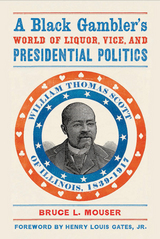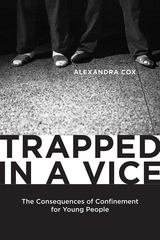
Scott helped build the National Negro Liberty Party to forward economic, political, and legal rights for his race. But the hustling that had brought him business success proved his undoing as a national political figure. He was the NNLP's initial presidential nominee, only to be replaced by a better-educated and more socially acceptable candidate, George Edwin Taylor.

Winner of the 2022 Catholic Media Association Award in Theology
A new ethics for understanding the social forces that shape moral character.
It is easy to be vicious and difficult to be virtuous in today’s world, especially given that many of the social structures that connect and sustain us enable exploitation and disincentivize justice. There are others, though, that encourage virtue.
In his book Daniel J. Daly uses the lens of virtue and vice to reimagine from the ground up a Catholic ethics that can better scrutinize the social forces that both affect our moral character and contribute to human well-being or human suffering.
Daly’s approach uses both traditional and contemporary sources, drawing on the works of Thomas Aquinas as well as incorporating theories such as critical realist social theory, to illustrate the nature and function of social structures and the factors that transform them. Daly’s ethics focus on the relationship between structure and agency and the different structures that enable and constrain an individual’s pursuit of the virtuous life. His approach defines with unique clarity the virtuous structures that facilitate a love of God, self, neighbor, and creation, and the vicious structures that cultivate hatred, intemperance, and indifference to suffering. In doing so, Daly creates a Catholic ethical framework for responding virtuously to the problems caused by global social systems, from poverty to climate change.

What drives the cycle of backlashes against women’s ongoing struggle for equality, freedom, and inclusion in American politics? In her innovative and provocative book, Suspect Citizens, Jocelyn Boryczka presents a feminist conceptual history that shows how American politics have largely defined women in terms of their reproductive and socializing functions. This framework not only denies women full citizenship, but also devalues the active political engagement of all citizens who place each other and their government under suspicion.
Developing the gendered dynamics of virtue and vice, Boryczka exposes the paradox of how women are perceived as both virtuous moral guardians and vice-ridden suspect citizens capable of jeopardizing the entire nation’s exceptional future. She uses wide-ranging examples from the Puritans and contemporary debates over sex education to S&M lesbian feminists and the ethics of care to show how to move beyond virtue and vice to a democratic feminist ethics.
Suspect Citizens advances a politics of collective responsibility and belonging.

Trapped in a Vice explores the consequences of a juvenile justice system that is aimed at promoting change in the lives of young people, yet ultimately relies upon tools and strategies that enmesh them in a system that they struggle to move beyond. The system, rather than the crimes themselves, is the vice. Trapped in a Vice explores the lives of the young people and adults in the criminal justice system, revealing the ways that they struggle to manage the expectations of that system; these stories from the ground level of the justice system demonstrate the complex exchange of policy and practice.

Luxury. The word alone conjures up visions of attractive, desirable lifestyle choices, yet luxury also faces criticism as a moral vice harmful to both the self and society. Engaging ideas from business, marketing, and economics, The Vice of Luxury takes on the challenging task of naming how much is too much in today's consumer-oriented society.
David Cloutier’s critique goes to the heart of a fundamental contradiction. Though overconsumption and materialism make us uneasy, they also seem inevitable in advanced economies. Current studies of economic ethics focus on the structural problems of poverty, of international trade, of workers' rights—but rarely, if ever, do such studies speak directly to the excesses of the wealthy, including the middle classes of advanced economies. Cloutier proposes a new approach to economic ethics that focuses attention on our everyday economic choices. He shows why luxury is a problem, explains how to identify what counts as the vice of luxury today, and develops an ethic of consumption that is grounded in Christian moral convictions.
READERS
Browse our collection.
PUBLISHERS
See BiblioVault's publisher services.
STUDENT SERVICES
Files for college accessibility offices.
UChicago Accessibility Resources
home | accessibility | search | about | contact us
BiblioVault ® 2001 - 2024
The University of Chicago Press









